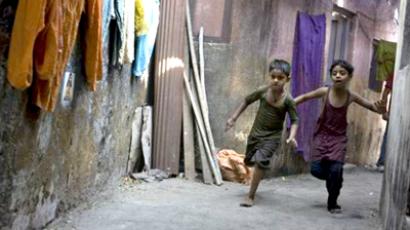Cheated out of childhood - India's hidden workforce
Millions of children across India give up their childhoods to work in the cotton fields to support their families. While earning only a few dollars, they are often physically, emotionally or sexually abused, rights activists warn.
From across the street, 16-year-old Naveen Prasade can hear the chatter of children a few years younger than him going to school. But his school-going days are long gone. Prasad was taken out of school to work on cotton plantations with the dream of making money for his family. “I went to the farm. I worked from 4 :00 am till 6:00 pm every day. There were 26 of us children working. I came back home as I wasn’t paid – so the work I did was for nothing,” he says.He was promised the equivalent of around two dollars but left the plantation that summer with nothing.RT obtained a hidden camera video from social workers who used the visuals to provide evidence to policemen in the area so they could conduct a raid and save the children.The social workers say that these children are regularly sleep deprived, hungry, overworked and oftentimes physically, verbally and sexually abused. “We need to highlight that the yield of BT cotton is produced with the blood and hard work of children who are working for 18 hours … We have seen many cases of girl workers being raped,” explains Praveen Singh, Gujarat State lead at Child Rights and You. The children are taken to the cotton plantations each summer and are used to pick cotton. Their fingers are better able to pick the crop and the farmers can lower costs by paying them less than adults. Usually agents or middlemen bring the children to plantations about 300 kilometers from their village for work. They say they are just trying to help the kids make money and that they too end up getting cheated in the process. “I went with 15 boys. I thought the more boys I can give him the more commission I will get for each worker,” says agent Manish Bhai Dabli.In many rural parts of India, schools for children above the age of 14 are rare, so many parents believe that if they send their kids away to work for the summer, at least they will not have to worry about how to feed them. “A vehicle would come here and pick them up and they would just go and work for two months. The fields that they worked on were secure and they could work with each other in a group,” Deepak Bhai Dabli, a relative of a working child, told RT.Seventy million children in India are engaged in labor work. However, agriculture is not included in the Child Labor Prevention Act. Seventy per cent of India's economy is dependent on agriculture so many argue that banning it would prevent children from working in the fields with their parents.Experts say that it is a problem that stretches far beyond India. There are plantations in the country that harvest BT cotton – the scientific abbreviation for genetically modified cotton. Monsanto, an American agricultural company that critics say has a monopoly on agricultural practices around the world, sells BT seeds to these farmers.Those familiar with the child labor situation say that these multinational companies should better investigate and be more responsible about where their seeds are going to ensure that the seeds are not used to harvest crops with child labor.“Too many international companies are investing and involved in BT cotton. If the cost of production is too high, multinational companies won’t like that,” according to Praveen Singh, from the Child Rights and You.For now, the victims of this mess, the scared children, can barely speak about their time at the plantations. Those who can, say they will never return.“I came back home now I won’t go back there. All 26 of us were cheated by them,” says child laborer Naveen Prasade.Cheated out of childhood – for the greedy to make a quick buck.














